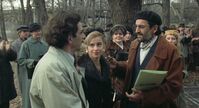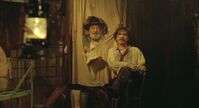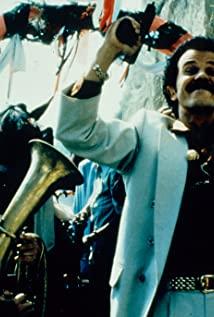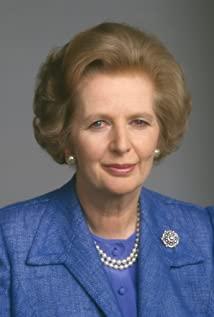While I was waiting for the bus at home and while I was on the bus, I watched the movie again. It was 170 minutes, neither too long nor too short. This movie is just like the American past. You can't understand it after watching it once. Only after watching it many times can you truly appreciate the excellence of this movie. This film won the Palme d'Or at Cannes in 1995, and was also at the top level in the Palme d'Or team. It is also an epic film and a well-deserved national epic. The layout is grand enough, the story exciting enough, and the ending intriguing enough. Like Farewell My Concubine, it can be called a perfect movie with few flaws. There are two versions of this movie, one is a 170-minute movie version, and the other is a 320-minute 6-episode TV series. Unfortunately, the TV series resources do not have subtitles, and the picture quality is very poor. I will continue to look for better resources. , I'm curious what the extra 150 minutes contains. Speaking of Yugoslavia, when I was a child, I saw this country as a document, so I went to the world map to find it, but I couldn’t find it. Later, when I grew up, I realized that this country no longer existed, and it was divided into Serbia, Croatia, etc. nation. This is a suffering country, but also a country with a glorious past. After experiencing World War II against the German fascists and striving for independence, during the Cold War, he independently launched the Non-Aligned Movement. After Tito's death in 1980, it went downhill and disintegrated in 1992. This country has experienced too much, and there is too much to say. This film stands in the deepest memory of this famous family and shows us the historical changes of this country that no longer exists.
The film itself is clearly divided into three parts with distinct titles, and the dividing line is two documentaries. And the three parts are very different. The first part is the war part. Starting in 1941, Ma Gao and Xiao Hei joined the Communist Party to fight against German fascism. The main characters also appeared in sequence, such as the heroine Natalie Jia, Ma Gao's younger brother Ivan, and the monkey Sony, etc. And he laid some foreshadowings. For example, when the German bomber attacked, the monkey Sony opened the cage with a key and escaped, laying a foreshadowing for him to get into the tank and fire behind him. Ivan hung himself at every turn to echo him. And the characters of the two male protagonists and female protagonists are well portrayed. Ma Gao is humorous and uninhibited by nature. When the German army calls, he is still looking for fun, but he is calm and calm, and rescues Xiao Hei who was kidnapped by himself. Xiao Hei was reckless, impulsive, half-hearted, shot and killed French officer and rival in love in front of all the German soldiers. The name is also very interesting, it must be reminiscent of fascism. Injury, when his wife died, he was still having fun with Natalie Jia. The female protagonist Natalie Jia is slutty by nature, mercenary, and oscillates between the two male protagonists. In her concept, she will follow whoever is stronger. She knows that Xiao Hei likes herself and is ambiguous with Ma Gao. Overall, the tone of the first part is quite cheerful.
After a period of victory in the Anti-Japanese War, Tito won the popularity and Ma Gao became Tito's right-hand man to greet the cheering documentary, and the film entered the second part, the Cold War part. The time came to 1961, and the plot began to reverse rapidly in this part. Ma Gao, who was originally thought to be a good man, began to deceive the people living in the basement to take refuge after he was in power. The war was already over, but he kept deceiving them. The war is still going on. , Xiao Hei has not been out of the basement since he injured himself. Ma Gao announced that he was dead and erected a statue to commemorate him. and make their stories into movies. Let the underground produce weapons and then bring them up to sell and profit from them. Team up with grandpa to deceive the people. On the day of Xiao Hei's son's wedding, Ma Gao took his son out to fight against the fascists. Sony the monkey got into the tank and opened fire, destroying the basement. Ma Gao and Natalie Jia blew up the basement with dynamite to kill them and fled. Xiao Hei and his son walked out of the basement and met Zheng Hao. The crew of the filming fled after shooting the actor who played the fascist. Xiao Hei took his son to swim, and the enemy fighter plane appeared in the middle. Xiao Hei fought back with a gun and caused his son to drown. The second part ends. This part focuses on the hypocrisy and deception of the people under the communist dictatorship. Ma Gao really represents the ruler, and his deception to the people is not unskilled. He was undoubtedly the biggest beneficiary of the victory of World War II. Although Natalica is not a positive character, she still feels a little guilty about deceiving the people. Xiao Hei's reckless and impulsive character is once again reflected, he shoots and kills without thinking, and fights with the enemy to cause his son to drown. The second part of the film begins to develop in a tragic direction.
Nearly 20 years after Margao escaped, Tito died in 1980. The film used a documentary to show his funeral. Ceausescu, Arafat, and Brezhnev all attended the funeral, and Yugoslavia began to decline.
Then the plot enters the third part, Yugoslavia disintegrates, the time is 1992, Ivan searches for Sony, whose whereabouts are unknown after the gun is fired, he is imprisoned in a mental hospital with white hair, Ma Gao becomes an arms dealer in a wheelchair, Xiao Hei became the leader of the army. Yugoslavia is in civil war. After Ivan came out of the mental hospital, he returned to find Sony. After learning that he was deceived by his brother, he killed Ma Gao with a cane. He also committed suicide by hanging himself. little black. After learning the truth, Xiao Hei suffered after the cross of Jesus, and sat alone in the basement of the year with Sony, as if hearing the call of his dead son, he fell into the well, and he saw all the dead people in the water. After swimming ashore, cheering and celebrating. Xiao Hei's son held a wedding again. Xiao Hei and his wife were loving and loving. Xiao Hei forgave Ma Gao and Natalie Jia. Natalie Jia's disabled brother stood up. , the movie ends.
Let me tell you some details and symbols of this movie
1. Everyone in the film represents a role. Ma Gao represents the leadership and decision-making class. Through him, you can see the shadow of Tito, which is a symbol of national power. Xiao Hei represents the army and is a symbol of military power. At the end of the film, he also became the leader of the army, and Natalie Jia represented the opportunists and dealt with various forces. And Ivan and Natalika's younger brothers undoubtedly represent the bottom of society, they are the class that is deceived and oppressed.
2. The basement represents a small society. The relationship between the basement and Ma Gao is the epitome of the whole country. The masses in the basement were deceived by Ma Gao and became Ma Gao's profit-making tool. Ma Gao blew up all the masses for his own personal gain. , implying the hypocrisy of the state power and the darkness of the society, the rulers disregard the life and death of the people, the above-ground society and the underground society are the same.
3. The destruction of the basement started with the monkeys firing from tanks. Full of irony, animals have been causing a big change. It shows that Yugoslavia, like the basement, is indestructible on the surface, but it is actually vulnerable, and animals can do it if they want to destroy it. imply the fragility of the regime.
4. Why did Xiao Hei let Ma Gao solve it on his own after Ma Gao and Natalica had an affair with Xiao Hei, but Ma Gao obediently gave in and injured his leg? I think Ma Gao understands Xiao Hei's character. Although Ma Gao is superior in intelligence, he is far inferior to Ma Gao in terms of force and ruthlessness. Another possibility is that Ma Gao thought Ma Gao heard him and Nata. All of Lijia's conversations, knowing Ma Gao's deception to people, thought it was exposed, but in fact, Xiao Hei only heard the second half of the conversation and didn't know Ma Gao's conspiracy at all. In short, it reflects Ma Gao's deep fear of Xiao Hei, and represents the regime's dependence on military power. The so-called power comes from the barrel of a gun, and no matter how powerful the ruler is, he needs the support of the army. (probably overinterpreted)
5. Ma Gao's dealings with enemy planes led to his son's drowning, implying that the country's use of force and arms race will only bring disaster to the people, and finally hurt himself and cause irreparable losses.
6. Ivan beat his brother to death with a cane. Very relieved. It symbolizes that even if the ruler is supreme, the people can overthrow you little by little, the people can support you and overthrow you, and water can carry a boat and capsize it. It is the people at the bottom who overthrow the rulers.
7. Xiao Hei was in agony before the cross of Jesus after learning that he ordered the killing of Ma Gao and Natalie Jia. He already had the thought of redemption at this time, and the cross was intact in the place where the gunfire was flying. This is the director's humanistic redemption spirit.
8. Xiaohei met all the dead people in the water after he threw himself into the well. After they swam ashore, they celebrated on land. This is a beautiful utopia. Yearning and pursuit of a peaceful and beautiful life. It also dilutes the tragic color at the end of the film.
9. At the end of the film, the place where everyone celebrates is separated from the land to form a loneliness, and it continues to drift forward, symbolizing the disintegration of Yugoslavia. Everyone floats forward with the small island in laughter and laughter, implying that everyone and the once brilliant Like Yugoslavia, we walked into the deepest part of history together. Towards death with Yugoslavia. This is the most meaningful shot in the whole film.
In fact, the development history of Ma Gao and Xiao Hei is the development history of the entire Yugoslavia. Both of them fought against fascism for national independence. Ma Gao was brilliant and deceived and finally suffered his own consequences. Xiaohei Xinfeng finally went to perdition and lost his relatives by force all his life. The same is true for the development of the country of Yugoslavia. Unlike "Once Upon a Time in America", where noodles and Max represent the opposition of two values, the values of Xiao Hei and Ma Gao are essentially the same. Neither of them are positive characters, but they promote the development of the country and cause national division. .
There are two sentences in the movie that are the finishing touch and the theme of the movie. The first sentence is the words of a mental hospital doctor, the basement is like a cage, and the second sentence is what Ivan said at the end: We should not forget the memory and pain that the country has brought us. The director is accusing and denouncing the harm this country has done to the people of the past, the deception of the masses and the disaster caused by the division of the country. At the same time, through the mouth of Ivan, I told people to always remember the history of the country. Although it is unbearable and sad, to forget the past is to betray the present. In any case, the history of a country is the most precious memory of a nation. perish, but history and memories cannot be dissipated. A nation that has the courage to face up to and face suffering and pain is a great nation. When the film was released in 1995, it was only three years after the division of Yugoslavia. This film was the director's remembrance for the motherland, as well as an elegiac couplet and eulogy for the motherland. Once the five histories are perfectly combined, a movie has an epic temperament, and it is difficult to imagine it is not great.
Recently, I have been making up for the Palme d’Or in Cannes, and I prefer the older and less popular ones, such as “Tin Drum”, “The Tree of Clogs”, “Leopard”, “Pell the Conqueror”, “Sweet Life” and “Goose” "Nan Fei" and so on, "Underground" ranked at least in the top three positions in all the Palme d'Or, both in terms of artistry and storytelling.
Recently, I am looking for the 320-minute TV series version of "Underground". I have no subtitles. If there is a subtitled version, you can contact me. There must be a heavy thank you.
View more about Underground reviews









